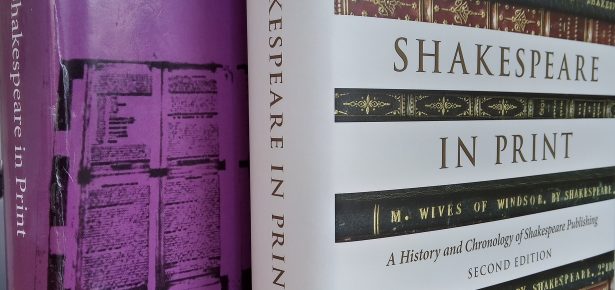
My study of the history of Shakespeare publishing and editing, Shakespeare in Print, first appeared in 2003. In recent years, it has come to feel that the book was in need of significant updating and revision, for two main reasons. Firstly, a broad range of exciting new work – often authored by younger scholars – has been published, which has helped significantly to reshape the way in which we understand the publishing trade of Shakespeare’s time. As it happens, a great deal of this work has been published by Cambridge, with consecutive editors at the press having developed a noted reputation for nurturing new talent in the field of book history and Shakespeare studies. I include below a sample of some of the books that I found particularly helpful in reshaping my own volume.
The second thing that persuaded me that a new edition was needed was the extraordinary growth in digital publishing over the course of the past two decades. Tracking the history of the digital text presented some particular challenges. Ironically, there is a sense in which it is easier to plot early modern book history than it is to map out the history of digital publishing. The publishing trade in Shakespeare’s time was highly regulated and, under pressure from the authorities, those involved in the trade were pretty fastidious about keeping records. By contrast, digital publishing has grown haphazardly and without much in the way either of regulation or of those involved having an eye to the future. Thus, for instance, while we can say with reasonable confidence that Shakespeare was first brought to print by the printer-publisher Richard Field, it is impossible to be certain about the first person to create a digital version of a Shakespeare text.
For what it is worth, my money is on two groundbreaking scholars, working independently of each other: Dolores Marie Burton and Sally Yeates Sedelow, both of whom produced digital texts in the mid-1960s. What amazed — and delighted — me about discovering Burton and Sedelow’s roles in the creation of early digital editions is that, with notable exceptions tracked by Molly G. Yarn in her forthcoming Cambridge volume (see below), the tradition of editing Shakespeare has been dominated by men, so it was heartening to find that here, at the beginning of a new age of Shakespeare publishing, we find two women scholars at the cutting edge.
The history of Shakespeare in print — and now beyond print — offers us important insights into the way in which culture is formed and changes over time. As younger generations of scholars continue to excavate the details of this history our understanding of the topic will further deepen and expand. Who knows, perhaps a third edition of Shakespeare in Print may be needed to take account of this exciting new work in a few years from now.
Christie Carson and Peter Kirwan (eds), Shakespeare and the Digital World: Redefining Scholarship and Practice (2014)
Emma Depledge, Shakespeare’s Rise to Cultural Prominence: Politics, Print and Alteration, 1642-1700 (2018)
Emma Depledge and Peter Kirwan (eds), Canonising Shakespeare: Stationers and the Book Trade 1640-1740 (2017)
Adam Hooks, Selling Shakespeare: Biography, Bibliography, and the Book Trade (2016)
Margaret Jane Kidney and Sonia Massai (eds), Shakespeare and Textual Studies (2015)
Peter Kirwan, Shakespeare and the Idea of Apocrypha: Negotiating the Boundaries of the Dramatic Canon (2015)
James Purkis, Shakespeare and Manuscript Drama: Canon, Collaboration, and Text (2016)
Molly G. Yarn, Shakespeare’s ‘Lady Editors’: A New History of the Shakespearean Text (forthcoming, 2021)
Latest Comments
Have your say!